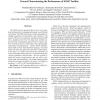Free Online Productivity Tools
i2Speak
i2Symbol
i2OCR
iTex2Img
iWeb2Print
iWeb2Shot
i2Type
iPdf2Split
iPdf2Merge
i2Bopomofo
i2Arabic
i2Style
i2Image
i2PDF
iLatex2Rtf
Sci2ools
110
click to vote
GRID
2004
Springer
2004
Springer
Toward Characterizing the Performance of SOAP Toolkits
The SOAP protocol underpins Web services as the standard mechanism for exchanging information in a distributed environment. The XML-based protocol offers advantages including extensibility, interoperability, and robustness. The merger of Web services and grid computing promotes SOAP into a standard protocol for the large-scale scientific applications that computational grids promise to support, further elevating the protocol’s importance and requiring highperformance implementations. Various SOAP implementations differ in their implementation language, invocation model and API, and supported performance optimizations. In this paper we compare and contrast the performance of widely used SOAP toolkits and draw conclusions about their current performance characteristics. We also provide insights into various design features that can lead to optimized SOAP implementations. The SOAP implementations included in our study are gSOAP 2.4, AxisC++ CVS May 28,
| Added | 01 Jul 2010 |
| Updated | 01 Jul 2010 |
| Type | Conference |
| Year | 2004 |
| Where | GRID |
| Authors | Madhusudhan Govindaraju, Aleksander Slominski, Kenneth Chiu, Pu Liu, Robert van Engelen, Michael J. Lewis |
Comments (0)

